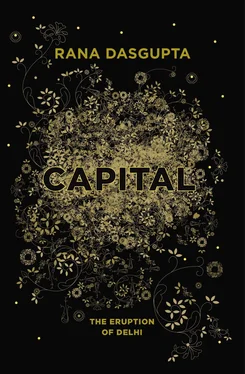“But unknown to me, this caused a big problem. Because the real significance of the tea boy was not that he delivered tea but that he took away all the accumulated cash from the reservation windows. There could be a raid at any time and if you’re caught with all that cash you have no way of explaining it. So the tea boy was the person who took it away and kept it until the end of the day. He was essential to their livelihood. They were furious when I took him away. I’m sure he’s back again now.
“Such things made me very unpopular. I was disrupting the entire economy of the station, and everyone felt I was their enemy. Once the vigilance inspectors came round to check what was going on. They are the people who investigate corruption, and they’re obviously highly corrupt. They collect bribes and they’re foul-mouthed. They insult everyone. The unions wanted me to shut them out, which I refused to do: in fact, I was quite happy about them coming.
“The unions are very big in stations. They have links to the top and they’re very powerful. They got 500 people to surround me, shouting in chorus, ‘ Meenu Sharma murdabad! ’ (‘Death to Meenu Sharma!’). Just because I let the vigilance inspectors in.
“Nowadays, the first thing I do when I go to a new posting is get rid of all the chairs in my office so that large numbers of people cannot sit down. They like to intimidate you like that. It’s difficult to get people out when they are sitting.
“People also play the caste card a lot. There was a man who used to come to me every day when I was working in the station to say, ‘My name is Sharma.’ I used to think he was an idiot, telling me his name every day. I’m naive about these things. It took me so long to realise that he was telling me he was from the same caste community as me and therefore expected special favours.
“But I ended up gaining respect there. Because I made no exceptions. If you make exceptions, you make money, but you also arouse resentment. I would transfer everyone, according to the rules. No one could pay to avoid it.
“In my early years in the railway service, I had an amazing boss. He was a very intelligent man who really taught me how to do my job. His lesson to me was that all documentation had to be well argued. You couldn’t just write, Request rejected . Enormous money was at stake and people could always come back afterwards and accuse you of things. Why did you reject that request? He was a wonderful mentor to me. He worked very hard, and he used to keep the most amazing documentation.
“Later on, I discovered he was exceedingly corrupt. He could make precise arguments for anything but they were always the arguments that earned him the most money. While I was working with him, he was looking to purchase cleaning equipment for Indian railway stations. He asked me to draw up a detailed comparison of all the products on the market. But what I only knew later was that one multinational company had paid him a large fee to give them the contract. He did very extensive research and then he wrote the tender such that only his client’s equipment could fulfil it. It looked like an open tender, of course, but the guidelines only matched one company.
“He was very smart. He could never be caught on file. He worked very long hours — he used to call me at 6 a.m. from the office.”
“People make a lot of money,” says Amit. “They have the same problem as criminals: where do they hide their cash? A couple of weeks ago one of our senior colleagues was found with 10 lakhs [$20,000] concealed in his toilet cistern.”
The bureaucracy is a vast cash generator, which is why there is so much cash in the Delhi economy. In central Delhi markets you see hundreds of banknotes in customers’ wallets. The big jewellery stores feel like banks, which is, in a way, what they are: people use them to convert cash into gold, many thousands of dollars at a time. The cashiers’ desks are noisy with the constant whirr of counting machines flicking banknotes.
The ultimate destination, however, for all this cash, is property. It is still common in Delhi for people to pay for 60 per cent of, say, a $4 million property in cash, a practice which has been clamped down upon much more quickly in, say, Mumbai. In Delhi the booming, multibillion-dollar property market owes its very existence to the constant need to offload large amounts of cash, so things do not change so fast. In any property deal the two key pieces of information are the price of the property and the proportions of ‘white money’ — declared money, paid by cheque or bank transfer, and ‘black money’ — cash.
Amit says, “Friends of my parents in Patna say to them, ‘You have not one but two bureaucrats in the family! Soon you will have more cars and houses than you can count!’ Unfortunately, they don’t know us.”
He grins.
“They gave me a job in vigilance,” says Meenu, “investigating corruption. I registered charges against several senior bureaucrats, which was a huge insult. They removed me very quickly. They never expected me to do that.
“Getting a reputation as a difficult junior is a serious thing. If you don’t laugh at a senior’s jokes, if you’re not corrupt enough, if you make your boss look bad in front of his boss — you get a reputation for being difficult, and you don’t get promoted.
“At the same time, you need a lot of skill to play that game and honestly I don’t have that skill. If someone does you a favour — a senior bureaucrat gives you a desirable posting for instance — how will you repay it? My boss called me and said, ‘I’m taking my family on a trip to a resort in your district. I need a place to stay, transport, etc.’ I didn’t even realise what he was asking. I just said, ‘Thank you for telling me.’ But he expected me to organise free tickets and hotels for him. Later on, he punished me by transferring me five times in rapid succession and making my life hell. But the thing is that even if I had realised what he wanted, I wouldn’t have known how to do it. He expected me to have a whole network of relationships with small businesspeople in the state — travel agents, hotel people — from whom I could ask favours. But it’s a very complicated thing to maintain. Once you accept favours from those people, you’re vulnerable to anything they ask.”
“There was a businessman who was constantly offering to send me on luxurious trips,” says Amit. “He would call me and say, ‘Let me sponsor a trip to Goa for your family. Or would you prefer to go to Italy?’ If I had accepted, he would have held it over my head for ever. He wanted me to push through a scheme for a new railway to Assam.”
“This is a constant problem for bureaucrats. The ideal bureaucrat is able to avoid getting to close to any particular businessman, because if he does, it means he is unable to offer favours to others and he appears to be exclusive.”
I ask them why they think things work like this. Amit says, “Politicians have become more invulnerable in these years of fragile coalition governments. The government needs its coalition partners so much, it will protect them from anything. They may be pathetic ministers but they are too important to the ruling coalition to be allowed to fail.”
Meenu continues, “I blame it on the business class, which is always willing to pay for advancement. Everybody wants to be in the fast lane. If you go to the parties that the income tax people hold, it is as if the entire business class of Delhi is out to please them. They take these guys out and give them whatever they want.”
“Party culture is very important,” says Amit. “Networking is crucial to business and politics in Delhi, and these parties give you a heady feeling. Golf: who you play golf with is very important. Do you play with this secretary from this ministry or just someone lowly? That establishes your position. These days a bureaucrat can’t just sit around, do his work and pull rank like in the old days. You have to go to the parties and network. Then you get to do favours for powerful people, which is where it all leads. It’s such a buzz that many people don’t even do it for money. They just want to be at the centre of the network.”
Читать дальше











